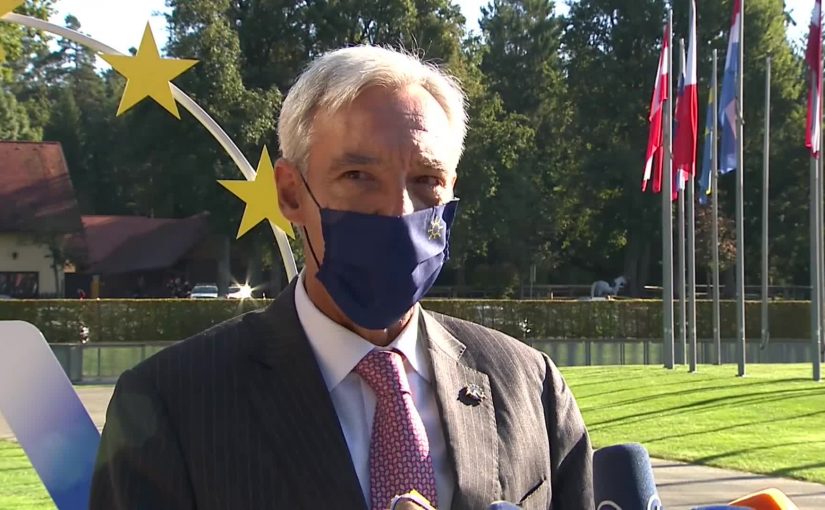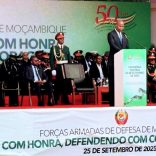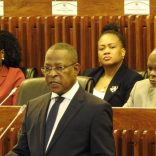Mozambique: Leader of the CAD coalition, which supported Mondlane, to turn himself in - Watch
Mozambique: Planned EU military mission ‘progressing well’ – Portugal minister

Arrival of João Gomes Cravinho, Minister of National Defence of Portugal, at the Informal meeting of EU Defence Ministers, taking place on 2 September 2021, in Kranj, Slovenia. [Image: European Council Newsroom]
The creation of a European Union training mission (EUTM) to help Mozambique’s military tackle armed rebels in the north of the country “is progressing very well” with “many contributions” from member states, Portugal’s minister of defence, João Gomes Cravinho, told Lusa on Thursday.
Speaking in Slovenia on his arrival at an informal meeting of EU defence ministers, at which the 27 member states were to take stock of the EU’s operational activities around the world, including the establishment of the military training mission to Mozambique that they approved in July, Gomes Cravinho said that Wednesday had seen a first informal meeting in Brussels – at the level of permanent representatives – to decide on the make-up of the force, and that this had gone in a “very positive” way.
“Mozambique and the formation of the European Union training mission is progressing very well, very quickly, with great receptiveness, and with many contributions from EU member states,” he told Lusa, expressing “great satisfaction” on that front.
Arrival and doorstep by João Gomes #Cravinho @defesa_pt at the Informal meeting of #Defence Ministers, taking place on 2 September 2021, in Kranj.https://t.co/fPUf5Uv3Aj
— EU Council TV News (@EUCouncilTVNews) September 2, 2021
Regarding Wednesday’s meeting, at which member states’ permanent representatives had political instructions from their capitals regarding the participation of military personnel from each country, Gomes Cravinho – while refusing to reveal details of the readiness expressed by EU members – stressed that the meeting was “very positive” and that it gave him “full confidence” that the mission would be on the ground early next month, as planned.
“It was an informal meeting to, let’s say, take the pulse of the member states, and this has already given us very positive indications for the formal meeting that will take place a week from today,” he said. “What happened yesterday [Wednesday] gives us full confidence that the mission can meet its objective of starting [work on the ground] in a few weeks, in early October.”
On 12 July EU foreign ministers approved the establishment of a training mission to Mozambique to “train and support the Mozambican Armed Forces” in “restoring security” in Cabo Delgado, a province in the north of the country that has been the scene of attacks by armed groups since 2017 that have claimed more than 3,100 lives and left more than 817,000 people displaced. Responsibility for some of the attacks has been claimed by a local affiliate of Islamic State.
The aim of the EUTM, which is to be commanded by Brigadier-General Nuno Lemos Pires of Portugal, and whose launch was a priority of Portugal’s stint as holder of the presidency of the Council of the EU in the first half of this year, is to train Mozambique special forces to develop a rapid reaction force to transform the situation in Cabo Delgado. It is supposed to be on the ground and operational at the beginning of October, and remain there for 28 months.
Mozambique’s Defence and Security Forces have since early August had the support of 1,000 members of Rwanda’s military and police in their fight against the armed rebels, under a bilateral agreement between Maputo and Kigali.
Mozambique is also receiving support from the Southern African Development Community (SADC) with a mandate for a “joint force on standby” approved on 23 June. Military personnel from some SADC member countries are already on the ground.
On Monday Mozambique’s president, Filipe Nyusi, said that his forces’ military advances in Cabo Delgado were opening up “good prospects” for the stabilisation of the region.
“We will continue to be very attentive to the movement of terrorism, but the results achieved so far open up good prospects for restoring the environment of stability and predictability so necessary for the development of business throughout the national territory,” he said.
The attacks have disrupted plans for Africa’s largest foreign investment, in the form of a natural gas processing plant overseen by Total, which suspended work earlier this year after the rebels took a major nearby town.












Leave a Reply
Be the First to Comment!
You must be logged in to post a comment.
You must be logged in to post a comment.